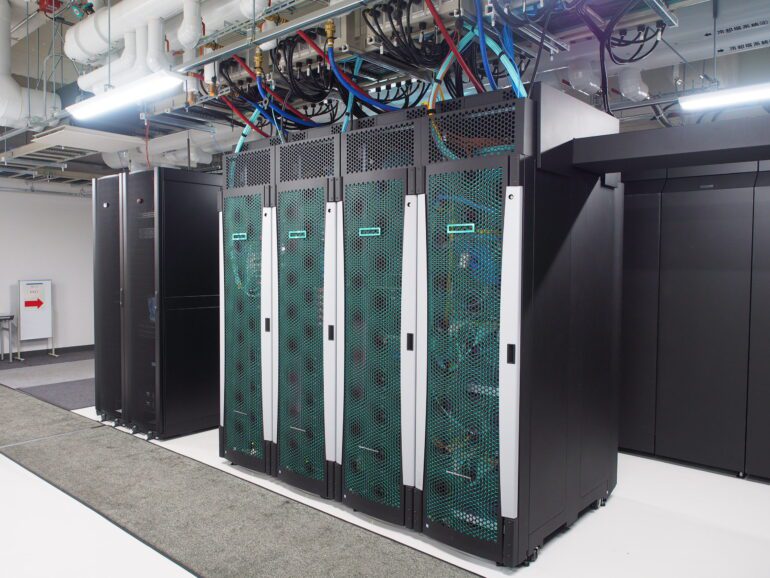TL;DR:
- HPE and Tokyo Tech are collaborating on the development of TSUBAME4.0, a next-generation supercomputer.
- TSUBAME4.0 aims to accelerate AI-driven scientific discovery in medicine, materials science, climate research, and urban turbulence.
- The supercomputer will enable users to train more AI models and run computational science and analytics applications simultaneously.
- TSUBAME4.0 will be operational in spring 2024 at Tokyo Tech’s Suzukakedai campus.
- The supercomputer will utilize HPE Cray XD6500 supercomputers for maximum performance and specialized capabilities.
- It will provide significantly higher performance compared to its predecessor, TSUBAME3.0, with 20 times more accelerated computing power.
- TSUBAME4.0 will support research in cyclic peptide drug discovery and large-scale molecular simulations.
- The theoretical peak performance of TSUBAME4.0 is 66.8 petaflops at 64-bit double precision.
- It will be a “supercomputer for everyone,” addressing the computational demands of various users.
- The collaboration between HPE, Tokyo Tech, and NVIDIA aims to drive scientific and AI-driven missions forward.
- TSUBAME supercomputers have been widely used by industries, academia, and government organizations worldwide.
- Tokyo Tech’s GSIC is recognized for its advanced supercomputer center and pioneering use of GPU-enabled systems.
Main AI News:
Hewlett Packard Enterprise proudly announces its partnership with the Tokyo Institute of Technology (Tokyo Tech) Global Scientific Information and Computing Center (GSIC) in the development of its state-of-the-art supercomputer, TSUBAME4.0. This cutting-edge computing powerhouse is poised to accelerate AI-driven scientific breakthroughs in the fields of medicine, materials science, climate research, and urban turbulence.
Renowned for its excellence in science and technology, Tokyo Tech is a global leader in academia. With the unveiling of TSUBAME4.0, researchers will gain unprecedented capabilities to train a multitude of AI models and seamlessly execute computational science and analytics applications. This advancement promises to amplify research efforts and enhance overall productivity.
Scheduled to be fully operational in the spring of 2024, TSUBAME4.0 has been procured under the Japanese government’s stringent procurement rules and awarded to HPE Japan. The supercomputer will find its home in a purpose-built facility at Tokyo Tech’s Suzukakedai campus, ensuring an optimal environment for groundbreaking computations.
At the core of TSUBAME4.0’s architecture lies the powerful HPE Cray XD6500 supercomputers, engineered to deliver unrivaled performance and specialized capabilities necessary for complex scientific investigations. These highly dense systems are purpose-built to support accelerated computing, offering optimized power for AI, analytics, and image-intensive applications.
Professor Yutaka Akiyama, from Tokyo Tech’s School of Computing, praises the pivotal role of TSUBAME in their research endeavors, particularly in the field of cyclic peptide drug discovery, which represents the future of pharmaceutical advancements. TSUBAME has consistently stood as a steadfast partner, aiding in the realization of groundbreaking achievements. With TSUBAME4.0’s significant acceleration, researchers eagerly anticipate its support in driving intelligent drug discovery through large-scale molecular simulations fused with cutting-edge deep learning technologies, ultimately generating highly accurate predictive models.
TSUBAME4.0 is set to achieve an astounding theoretical peak performance of 66.8 petaflops at 64-bit double precision. Furthermore, the system will exhibit an impressive 952 petaflops at 16-bit half-precision, delivering an astonishing 20-fold increase in accelerated compute performance compared to its predecessor, TSUBAME3.0. This monumental leap in performance will cater to the burgeoning computational demands of countless users, positioning TSUBAME4.0 as the quintessential “supercomputer for everyone.”
Justin Hotard, Executive Vice President and General Manager of HPC, AI & Labs at HPE, acknowledges the indispensable role of supercomputing in driving scientific research, engineering breakthroughs, and AI initiatives worldwide. Tokyo Tech’s commitment to investing in supercomputing and its dedication to making it accessible to a wider community is exemplary.
HPE is thrilled to continue its fruitful collaboration with Tokyo Tech and NVIDIA, pooling their expertise to build TSUBAME4.0. This groundbreaking system, infused with HPE Cray supercomputing innovation, will unleash the colossal computational power needed to bolster Tokyo Tech’s ongoing scientific and AI-driven missions.
Since the launch of TSUBAME1.0 in April 2006, the TSUBAME supercomputers have been instrumental in providing unparalleled computing resources to global industries, academic institutions, and government organizations alike. Tokyo Tech’s GSIC, as the pioneering university to adopt GPU-enabled supercomputers, has garnered international acclaim for establishing one of the world’s most advanced and cutting-edge supercomputer centers.
Conlcusion:
The collaboration between HPE and Tokyo Tech to develop the TSUBAME4.0 supercomputer signifies a significant advancement in the market of AI-driven scientific research and innovation. This cutting-edge computing system, with its enhanced performance and specialized capabilities, opens up new possibilities for breakthroughs in medicine, materials science, climate research, and urban environments.
By providing researchers and scientists with the tools to train more AI models and execute complex computational applications, TSUBAME4.0 has the potential to revolutionize various industries and accelerate advancements in critical fields. Its status as a “supercomputer for everyone” further democratizes access to high-performance computing, driving widespread innovation and fueling the market’s growth in AI-driven technologies and solutions.

